BY VAZHA TAVBERIDZE
eneral Riho Terras is an Estonian politician and a former military officer serving as a member of the European Parliament since 1 February 2020. Prior to that, he was the Commander of the Estonian Defense Forces from 2011 to 2018. Radio Free Europe sat down with him to pick his brains on the war, and the West and Russia’s current thinking.
FOLLOWING THE POLAND MISSILE INCIDENT, SHOULD THERE BE MORE ALARM IN THE WEST?

Well, if there's war on the borders of NATO, there’s always potential for an incident. I think [that missile] rather helps Ukraine to get more support. And the meeting in Rammstein showed us that countries are willing to give more weapons and more economical support to Ukraine.
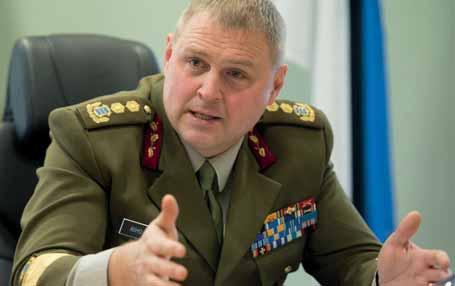


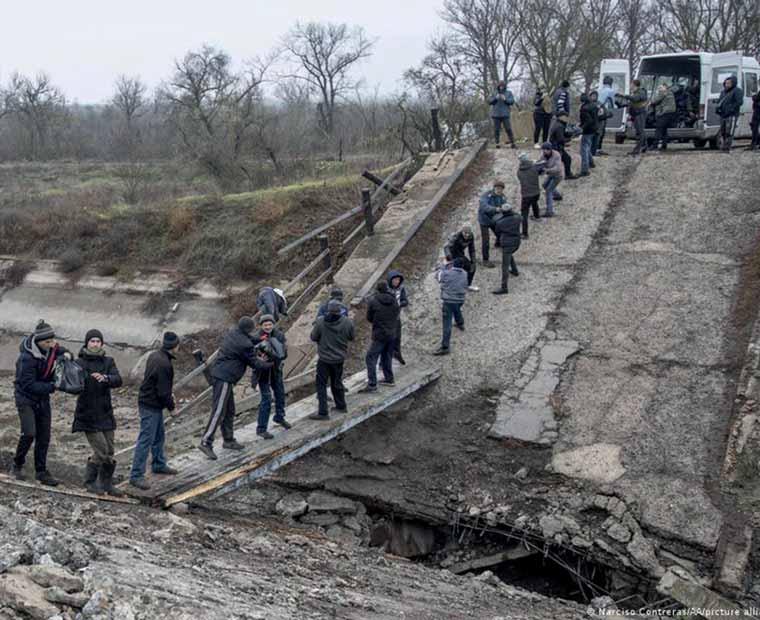
Issue no: 1376 • • DECEMBER 2 - 8 2022 • • PUBLISHED WEEKLY In this week’s issue... PRICE: GEL 2.50 SPORTS PAGE 11 POLITICS PAGE 4 POLITICS PAGE 6 EU Delegation Welcomes Submission of DeOligarchization Bill to Venice Commission UNDP, Japan and the National Forestry Agency Present Animated Manga about Forest Protection Forthcoming Anti-Piracy Policy Changes in Georgia: New Enforcement Mechanism for Intellectual Property Rights Why HIV Self-Testing Is Important for People in Risk-Groups Modern Security Dilemma: Georgian Polyhedron. Part 4 The Welsh-Georgian Warm-up SOCIETY PAGE 10 SOCIETY PAGE 11 BUSINESS PAGE 8 FOCUS ON UKRAINE "Once they wanted to destroy us with hunger, now with darkness and cold," President Zelensky said on the 90th anniversary of the Soviet-era Holodomor famine Continued on page 4 Markets of BONDSPricew/wm/mSTOCKSPricew/wm/m GRAIL 07/2880.44 (YTM 8.50%) +0,4%+4,8% Bank of Georgia (BGEO LN)GBP 24.90 0,2% +16,6% GEBGG 07/23100.56 (YTM 5.12%) 0,1% 0,1% Georgia Capital (CGEO LN)GBP 7.40 0,8% +17,8% GEOCAP 03/2493.79 (YTM 11.48%) 0,2% +0,2% TBC Bank Group (TBCG LN)GBP 22.00 3,1% +16,2% SILNET 01/2792.90 (YTM 10.52%) +0,1%+0,3% TBC 06/2498.13 (YTM 7.04%) +0,0%+0,5% CURRENCIESPricew/wm/m GEL / USD2,7092 0,2% 2,4% GEL / EUR2,8014 +0,8%+1,3% COMMODITIESPricew/wm/m GEL / GBP3,2397 +1,0%+0,6% Crude Oil, Brent (US$/bbl)83,19 4,9% 13,1% GEL / CHF2,8535 +0,8%+2,4% Gold Spot (US$/OZ)1 741,36 +0,2%+5,9% GEL / RUB0,0442 0,2% 2,0% GEL / TRY0,1454 0,2% 2,7% INDICESPricew/wm/m GEL / AZN1,5970 0,2% 2,4% FTSE 1007 474,02 +1,3%+6,0% GEL / AMD0,0069 0,2% 1,5% FTSE 25019 292,35 0,6% +7,7% GEL / UAH0,0733 0,3% 2,9% DAX14 383,36 +0,0%+8,6% EUR / USD0,9672 0,9% 3,6% DOW JONES33 849,46 +0,4%+3,0% GBP / USD0,8362 1,1% 2,9% NASDAQ11 049,50 +0,2% 0,5% CHF USD0,9491 1,0% 4,7% MSCI EM EE30,32 +3,9%+18,3% RUB / USD61,4302 +0,3% 0,2% MSCI EM930,77 0,0%
TRY
SP
AZN
MSCI
AMD
PreparedforGeorgiaTodayBusinessby
+10,1%
/ USD18,6288 +0,0%+0,2%
5003 963,94 +0,4%+1,6%
/ USD1,6969 +0,0%
FM2 093,03 +2,9%+6,0%
USD395,3800 0,0% 0,9%
INTERVIEW
G
MEP Gen. Riho Terras’ Message to the West: Beef Up Support! You Are in the War as Much as Ukraine Is
fi.ee
General Riho Terras. Photo by Rauno Volmar/maaleht.del
Photo by Narciso Contreras/AA/picture alliance
Ukraine Latest: 6 Million without Power on First Day of Winter
Friday, officials said, as engineers across the country sought to restore heat, water and power to major cities. 35 people were injured, including a child, and several private houses and high-rise buildings damaged, city official Galyna Lugova said. The shelling of Kherson, a key eastern city recently recaptured by Ukrainian forces, was the deadliest Russian bombardment in recent days.
and “the organization by Russia of illegal so-called referendums in regions within the internationally recognized borders of Ukraine”.
The Lithuanian Prime Minister, Ingrida Šimonyte, said on Twitter that the meeting had reconfirmed “the rules-based world order.”
Russia’s Central Bank announced that from January 1, it plans to cancel several support measures for Russian banks that were introduced since the imposition of Western sanctions after Moscow sent its troops into Ukraine in February.
BY ANA DUMBADZE
On the first official day of winter, nearly six million people across the majority of Ukraine’s regions have no electricity, Ukraine’s President, Volodymyr Zelensky said on Wednesday night.
Ukraine has accused the Kremlin of reviving the “genocidal” tactics of Josef Stalin as Kyiv commemorated a Sovietera famine that killed millions of Ukrainians in the winter of 1932-33. The remembrance day for Holodomor last weekend came as Ukraine battles to repel invading Russian forces and deal with sweeping blackouts caused by air strikes that Kyiv says are aimed at
breaking the public’s fighting resolve. “Once they wanted to destroy us with hunger, now with darkness and cold,” Zelensky wrote on Telegram. “We cannot be broken.”
On Wednesday, Ukraine’s state emergency services said nine people had been killed in fires, after breaking safety rules in an attempt to heat their homes after Russian attacks on power facilities.
“Only in the last day there were 131 fires in Ukraine, 106 of them in the residential sector. Nine people died, eight were injured,” the emergency services said.
THE LATEST DEVELOPMENTS IN RUSSIA’S INVASION OF UKRAINE
Russian shelling on the southern Ukrainian city of Kherson killed 15 civilians on
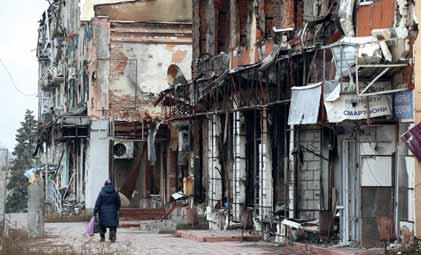
Ukraine’s national police chief, Ihor Klymenko, said 32 civilians had been killed in Kherson since 9 November, when Russian forces were forced to withdraw from the city that they had occupied for eight months, the Kyiv Independent reports. Since then, Russian troops have shelled Kherson frequently. On 24 November alone, the Russian military carried out 17 attacks on the city, killing seven people and injuring 21, according to a report by the Kherson Oblast governor, Yaroslav Yanushevych.
The prime ministers of Lithuania, Poland and Ukraine, Ingrida Šimonyte, Mateusz Morawiecki and Denys Shmyhal, met in Kyiv on Saturday for talks to discuss and reiterate their commitment to work together “in countering Russia’s armed aggression.”
The member states of the Lublin Triangle released a joint statement, condemning the “systemic war crimes committed by Russia’s forces in regions of Ukraine, including deliberate, indiscriminate, and disproportionate attacks against the civilian population and elements of the civilian infrastructure”.
The statement also condemned forced deportations of Ukrainians, continued attacks around Ukrainian nuclear sites
Britain this week imposed a new round of 22 sanctions on Russian officials accused of spearheading the mobilization efforts and the recruitment of “criminal mercenaries”.
The new sanctions hit Russia’s Deputy Prime Minister Denis Manturov, who London said is responsible for overseeing the country’s weapons industry and equipping newly mobilized troops, as well as 10 governors and regional heads in Dagestan, Ingushetia and Kalmykia, from where it noted: “a significant number” of conscripts have been drawn.
In a statement, the regulator said it will extend some measures, including on reserve requirements, but it will force banks to resume disclosing their financial statements and will not extend a relaxation in the open foreign currency position rules.
Speaking at the Berlin Security Conference, German Chancellor Olaf Scholz said that Russia could no longer win the war in Ukraine on the battlefield.
He noted that while Germany took Russia’s nuclear rhetoric seriously, it would not be cowed by it.
The Guardian, BBC, Al Jazeera
The Holodomor, also known as the Terror (or Great) Famine, was a man-made famine in Soviet Ukraine from 1932 to 1933 that killed millions of Ukrainians. The Holodomor was part of the wider Soviet famine of 1932–1933 which affected the major grain-producing areas of the Soviet Union.
While scholars universally agree that the cause of the famine was man-made, whether the Holodomor constitutes a genocide remains in dispute. Some historians conclude that the famine was planned and exacerbated by Joseph Stalin in order to eliminate a Ukrainian independence movement. Others suggest that the famine arose because of rapid Soviet industrialization and collectivization of agriculture.
Ukraine was one of the largest grain-producing states in the USSR and was subject to unreasonably higher grain quotas when compared to the rest of the country. This caused Ukraine to be hit particularly hard by the famine. Early estimates of the death toll by scholars and government officials vary greatly. A joint statement to the United Nations signed by 25 countries in 2003 declared that 7–10 million died. However, current scholarship estimates 3.5 to 5 million victims. The famine's widespread impact on Ukraine persists to this day.
Source: Wikipedia

City Hall Criticized for New Year’s Slogan: “Tbilisi, City of Peace”
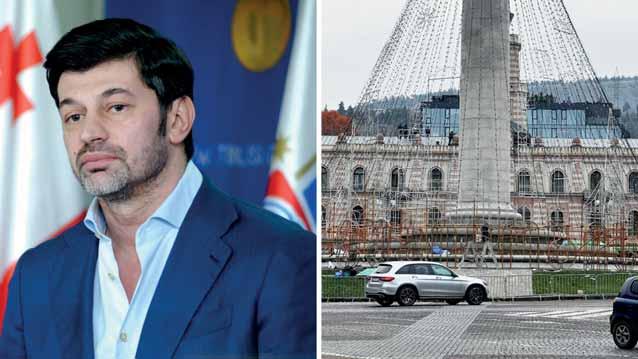 BY ANA DUMBADZE
BY ANA DUMBADZE
On November 29, it was announced that Tbilisi’s main New Year’s slogan will be “Tbilisi — City of Peace”. City Hall is installing the same inscription near the fairylight Christmas Tree in Freedom Square. The choice of slogan unsurprisingly resulted in a lot of criticism from a large part of society, considering there is an ongoing war in Georgia’s friend country – Ukraine.
slogan installed on Freedom Square.
“There was no political message in the New Year’s slogan – there is no alternative to peace. What should we do, friends, not wish for peace? Shouldn’t we send this cherished wish from Tbilisi to all the countries of the world?” the Mayor of Tbilisi, Kakha Kaladze, stated at a meeting of the capital’s government.
He claimed that the statements that Tbilisi’s 2023 slogan – “City of Peace” is a mockery of Ukrainians are the worst speculation and provocation.
Stoltenberg: Lesson Learned from Ukraine is that We Need to Support Georgia, Moldova and Bosnia and Herzegovina Now
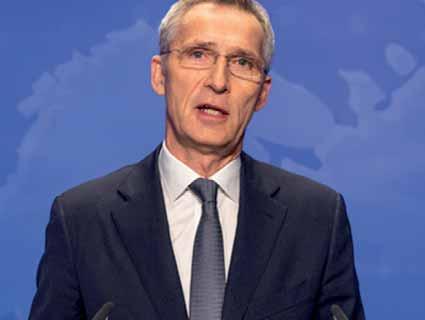
Following the Meeting of NATO Ministers of Foreign Affairs in Bucharest, Romania, Secretary General Jens Stoltenberg stated that “the Foreign Minister of Georgia was very much welcomed by NATO Allies together with the Foreign Ministers of Moldova and Bosnia and Herzegovina, in our last session, where we express our solidarity with all three partners. If there’s one lesson learned from Ukraine, it is that we need to support them now… [Their] being different, but under Russian pressure…It is much better to support them now than to see developments going in absolutely the wrong direction, as we saw with the invasion of Ukraine, earlier this year.”
He explained that this one of the reasons why, in Georgia, they have the training and relation center with dozens of NATO trainers. He added that the Allies had made new commitments for further support.
“We need to build a long standing partnership with Georgia and we use the office, we use the training center, to do exactly that. All Allies expressed their strong support for Georgia’s sovereignty and territorial integrity. At the same time, they underlined the importance of implementing democratic reforms in Georgia and working together with Georgia to implement the enhanced package of support that we have agreed on,” noted Stoltenberg.
On November 30, citizens held a rally demanding a change to the New Year’s
“This year, our New Year’s slogan will be ‘City of Peace’. Peace is very important for our country, for our city, and in the light of the challenges that are happening in the region, the situation in the world,
of course, the first thing anyone longs for is peace. I want to respond to a rather disturbing trend. When the government, the government of the capital, or other agency, voices an idea based on universal values, an initiative from the public, then immediate bullying, insulting, slandering starts. I don’t know what to call this situation, but I know for sure that this is not the order of our society. Yesterday, certain media outlets and politicians tried to present our New Year’s slogan as a mockery of our Ukrainian friends, which is the worst speculation and provocation that a person imbued with love for our country and city could ever do. I understand very well that these people have no love, respect or dignity for their homeland,” said Kaladze.
GEORGIA TODAY DECEMBER 2 8, 2022 2 NEWS
Sources:
A local resident walks past heavily damaged buildings in the town of Izyum, Kharkiv region, on November 25. Photo by Anatolii Stepanov/AFP/Getty Images
Image source: Netgazeti






























































































































Lenovo recommends Windows 11 Pro for business PREMIUM BUSINESS ULTRABOOK
EU Delegation Welcomes Submission of DeOligarchization Bill to Venice Commission
The EU delegation to Georgia on Tuesday welcomed the Georgian parliament’s decision to submit the deoligarchization bill to the Venice Commission, an Advisory Board of the Council of Europe, for the opinion before its final approval.

“We welcome the announcement that the Georgian parliament will take the positive step of sending the de-oligarchi-
zation draft law to the Venice Commission for opinion. Important to consult international standard setters and implement their recommendations,” the EU delegation tweeted. The ruling Georgian Dream party announced on November 28 that it would send the bill on de-oligarchization to the Venice Commission for legal review. The parliament will not consider the draft in the third reading until the opinion of the Commission is known.
Empathy Center: Saakashvili Has about 10 Diagnoses, which Makes his Imprisonment Unsuitable A

ccording to the Empathy Center, the third president of Georgia, Mikheil Saakashvili, has about 10 diagnoses, which makes his imprisonment unsuitable.
As stated in the report of the center, Mikheil Saakashvili has a fever of unknown etiology, anorexia, rapid weight loss, pain in his muscles, joints and bones, scratch marks on his body, and muscle spasms, which may be an unidentified infectious process and/or results of possible intoxication.
“[He] has more than 20 diagnoses, of which 10 are leading diagnoses, which makes his imprisonment unsuitable. The mentioned diagnoses have not yet been made public,” reads the information released by the center.
According to the Empathy Center and a commission of international experts, analysis of clinical and para-clinical examination and medical documenta-
tion, has concluded that before his arrest (01/10/2021), the patient was practically healthy.
“…Of the unidentified infectious process and/or results of possible intoxication, the toxicological examination of a
hair sample revealed more Ba, Bi, Mercury (Hg) than the documented limit. These toxic substances are dangerous because they can cause not only physical, but also sometimes mental disorders,” reads the information.

MEP Gen. Riho Terras’ Message to the West: Beef Up Support! You Are in the War as Much as Ukraine Is
It hasn’t been enough so far. I even wrote a letter to NATO to that effect, together with General Breedlove and other generals, right after February 24, saying that we need to create air superiority over Ukraine. NATO didn’t accept it. It doesn't matter whether it is NATO or the countries of NATO who do it, I still think they need to control the airspace over Ukraine.

All the NATO countries, except for Hungary and Turkey, which are playing their own games, are very unified behind Ukraine, and the support is increasing.
I have the feeling that the US could end the war very quickly if they wanted to. Russia is talking about NATO being at war with Russia, but NATO has not arrived yet, and Russia is losing already. A couple squadrons of F-35s would end the war. Of course, I understand the context of nuclear and that is another facet. China doesn't want Russia going nuclear. For China, the current situation is actually the best it could be: They can earn money from this war, but they aren’t really willing to have a nuclear conflict, because the only thing where China is not the world power is in nuclear arsenal. They don't want to be a smaller brother, and Russia needs China, at least for it not to be against Russia. It’s important for the Russians that the Chinese aren’t taking sides. I don't think a nuclear conflict is likely, but there's always a possibility of it with this mad government of Russia.
AFTER THE POLISH INCIDENT, A VERY PREVALENT AND CYNICAL LINE MADE THE ROUNDS ON TWITTER: “NATO WILL NOT START WW3 OVER TWO FARMERS”. JUST WHAT WOULD IT TAKE FOR NATO TO GET INVOLVED?
Well, if NATO's territory is attacked, and the Polish incident cannot be seen as such, NATO will become part of the conflict.
Nobody actually believed that Russia was suicidal enough to attack Ukraine from five different corners. There was a thinking that perhaps Russia might push into eastern Ukraine, perhaps into Kherson, but, really, everybody who could read, write and calculate was absolutely convinced that Russia would not attack Kyiv. But it did. So the question is, how far will they go? Logically, if you look at what the forces of Russia were on February 24, any military analyst would say - not logical, not possible, Russia will not do it, but they did.
WHY? DON’T THEY HAVE THEIR OWN MILITARY ANALYSTS?
I guess it was more to do with the assumption that the Ukrainians would celebrate their “liberation”. That’s the game the FSB junta around Putin played, and they were very surprised when they saw that nothing of the kind happened in Kyiv as had happened in Crimea when it was taken over. I very often have this feeling that people don't give Putin the real analyses; they just want to please him, and then they go and make sure his ideas are supported by the analyses, which is misleading.
Today, we see the Ukrainian army has become Europe's most powerful army, even compared to the Russian army. We need to beef up that Ukrainian army with assault weapons, battle tanks and planes, in order to give them the possibility to liberate Ukraine's occupied territories.
YOU ARE A FIRM BELIEVER OF UKRAINE'S VICTORY ON THE BATTLEFIELD. CAN YOU GUIDE US THROUGH HOW YOU SEE THAT HAPPENING, TACTICALLY?
I think the next objective should or could be Melitopol, which has always been important, key terrain. Second, the Ukrainians would need to take in other centers of the oblasts, in Donetsk and Lugansk. Donetsk especially would be a good case of victory, another Kherson for them. And to push beyond what was the line on February 24 would be very important, because it would show “We will take not only what was taken from us since February, no, we won’t be satisfied with that: We want it all back!” This area of Donbas is very rich in raw materials, the biggest lithium reserves in
Europe, fourth biggest in the world. So I think that would be a sign at which the world would then say, now we need to [help them] take it to the end. Today, still, there is not much trust that the Ukrainian army can do it. I believe in that possibility, though.
HOW EXACTLY DO YOU SEE THAT HAPPENING? IN DONETSK, THE UKRAINIANS HAD TO RETREAT. HOW DO YOU SEE THEM COMING BACK AND FLUSHING THE ENTIRE RUSSIAN DEFENSE LINE OUT?
Well, first they would need to do exactly what they have done to date: Move with good discipline, mission command at all levels, which is the secret to a good advance, shown in the Ukrainian but not in the Russian command structure. The Russian army has an immense shortage of command personnel. They're giving officer ranks to soldiers who just finished their studies in university- teachers, welders, no matter for the Russians: if you studied, you can be an officer. And that, of course shows that the training is very, very low. And on the other side, the Ukrainians are going through training in the European Union, a course we want to pass 15,000 soldiers through. So, good education, training and, of course, the Ukrainians themselves being very good at the art of war, doing things by surprise. Take Kharkiv for examplenobody was expecting them to go forward in the Kharkiv Oblast, but they are liberating it, the Russians are on the run! So I think the element of surprise will be there as well. Russians still have lots of stupid bombs and grenades, but they are being used against civilians. It's much more difficult to kill the Ukrainian sol-
diers, because they know how to behave.
THE TARGETING OF CIVILIANS SEEMS DELIBERATE, WITH THE AIM TO LOWER UKRAINIAN MORALE BY DRASTICALLY DIMINISHING THEIR LIVING STANDARDS. MIGHT IT WORK?
Well, I think it very much influences the morale of Ukrainians– they now hate the Russians even more. It’s working to the opposite effect. It is, again, an assumption which comes from the Russian side and is completely wrong. Do they think that if they keep bombing, the Ukrainians will start to lose their faith in their government? I haven’t seen it. And the polls don’t say it. It's more that every Ukrainian is very angry at the Russians. Another thing is Russia's diplomacy and propaganda working hard and very effectively on European citizens, telling them, “Please end the war, it is a bloody war. We don't need war in Europe. Please stop. Go to the negotiation table.” But even Joe Biden and his administration understand that Zelensky cannot be pushed to the peace negotiations, because it will be Zelensky’s political death sentence in Ukraine.
I think from the very beginning, the US wasn’t particularly interested in this conflict and escalation. I saw signs which, in my opinion, show that for Biden's administration, the best scenario would have been the scenario of the 2008 Georgia conflict: A small conflict, not too many killed, a change of governmentone that gives out nice words about how they want to join NATO and the European Union, whose representatives go to Brussels and Strasbourg in nice suits, but who, in reality, are really not willing to do what they need to do to join, making it is easy for the EU and NATO not to take them- because they prefer cooperation with Russia. That is what happening in Georgia, in my opinion. And that's only on the government- as I know, the Georgian people themselves want to be part of Europe and part of NATO, but the current government, I don't see them doing anything. I mean, Georgia was the best pupil for years when it came to progress towards NATO and the European Union. But today, there's nothing.
The same was a very comfortable scenario for Ukraine, too. Biden even said, and then after his press people corrected it and said he didn't mean it, that in the event of small conflict, they will not intervene. The US will not intervene. That was just before the war.
The other thing was when the American Embassy staff evacuated Kyiv before the others, really showing that they are will-
ing to give it up. And the idea of the US government offering Zelensky the chance to leave the country was another. So I think they thought: Three days, new government in Ukraine, they’ll still have talks about neutrality, perhaps about the EU, but not NATO, blah, blah, blah. But the problem was that they didn't give that memo to Zelensky, and so he didn't know that he should do that. He decided to fight back, and, it turns out, very successfully.
In early April, the Americans started to really believe that change is possible, that it is possible that the Ukrainians might win. And then they started to organize the support and started to send weapons, and they still are. Now they need to increase that support, because if the war doesn’t end with a Ukrainian victory, the Russian junta state will still be a problem for the world around it for years to come.
The important thing that everybody needs to understand, and what the West fails to understand, is that while the Russians can endure, can suffer and win, as they did in the Second World War, so can the Ukrainians. And that is the difference – the Ukrainians aren’t the western softies Putin likes to call them, but hardened fighters. They are the ones who invented partisan warfare, back in the times of Napoleon, and they showed it again during the WW2. The Ukrainians aren’t easy to take on. They have the spirit, and we need to send them enough weapons [to see it through]. That’s a problem in itself, because the European defense industry isn’t geared towards doing so. We are giving them what we have in stock, but we will soon run out ourselves, if we don’t start producing more.
But I am still a limited optimist here: I cannot see Russia winning. Ukraine has already won, even if they have to lose territory – comparable to Finland in 1939, the Winter War, when they had to give up Karelia, but kept their independence. Ukraine has already won the war for independence; now the question is whether we can make Russia lose, and that’s another step we need to make. Europeans need to understand that one or three degrees less heat in their offices or at home will save Ukrainian lives. We need to understand that war is going on in Europe, not just in Ukraine. People ask me – are you afraid, in Estonia? My answer is: “Talinn is exactly the same distance from Moscow that Berlin is, yet we don’t have Russian speakers here, we don’t have Russians demonstrating in support of Putin here as we have seen in Berlin, so you should understand that you are in the war as much as we are.”
GEORGIA TODAY DECEMBER 2 8, 2022 4 POLITICS
General Riho Terras. Source: Wikipedia
Continued from page 1

Modern Security Dilemma: Georgian Polyhedron. Part
BY VICTOR KIPIANI, CHAIRPERSON OF GEOCASE
The first three parts of this article were dedicated to the specifics of the Georgian case in the context of the modern security dilemma, and we discussed current trends and possible solutions. However, as with any nonlinear topics, discussing general issues is one thing while highlighting special “implementing” nuances, describing them in detail and evaluating them is a different (and specifically difficult) task.
Since we already talked extensivelyby making assumptions as well as affirmative statements - about the so-called framework theme of the Georgian security dilemma, in this part we will continue on from Part 3 and discuss operational methods and practical approaches of facilitating-strengthening Georgian security (in the broad sense of this word) for the interested audience.
DIPLOMACY FIRST AND FOREMOST
One of several means which in case of ceding will be tantamount to a fatal (geo) political result for the country, is the weight of word and the effectiveness of means in diplomacy whose: (a) multilayered, open or latent potential must be fully used up, (b) art of handling must be increased to its maximum degree, while (c) use must be perceived as the last “defensive barrier.”
Georgian diplomacy, as a key system of management of security, must be linked to the following necessary features of the aforementioned entirety of characteristics:
Crisis diplomacy – crisis management at a maximally early stage to avoid or reduce it must become a distinguished advantage of Georgian diplomacy. Considering modern threats, such diplomacy is, actually, an art that implies management of process in such a way that, owing to political-moral-psychological resilience and sometimes, pragmatic perseverance, makes it possible to replace all other means (military, sanctioning, etc.) of advocating own interests with diplomatic means and maneuvers. An accurate measure of effectiveness of such replacement could be the maintenance of a problem under a manageable regime, reduction of a degree of tension, preven-
tion of a latent or open conflict from getting out of control.
The priority of crisis diplomacy and use of needed public resources towards that must rest on universally recognized postulates as well as few postulates of Georgian origin: (a) the avoidance of a military conflict and war is a common national consensus which all participants of Georgian social and political process agree on; (b) there is no clear winner in a modern war; (c) involvement of a country in a military conflict or war is tantamount to its failure on the geopolitical arena. Clearly, these postulates have their absolutely natural rules of exception and they are: (a) open aggression against our country, infringement on its sovereignty and territorial integrity, and (b) fulfillment of international obligations which are assumed for ensuring peace and stability.
Diplomacy of balancing – perhaps one of the most arguable approaches, which is rather difficult to realize is to consider the specifics and complexity of balanced planning of events. This is the policy that equally requires competence, courage and luck.
It is necessary to neutralize the opinion according to which the balancing equals an unprincipled, unsystematic approach and conscientious ceding. In reality, it is an absolutely different thing and such approach to management of the security dilemma is already practiced by a number of countries, including those countries that are geographically far from a real source of threat and enjoy far more tangible security guarantees compared to others.
From a Georgian perspective, we view a political act of pragmatic balancing as the entirety of necessary components, such as (1) taking a targeted (often unpopular) decisions oriented on particular results (2) based on unbiased, rational and de-ideologized assessment of (3) existing and potential risks and threats in the region and beyond it (4) to facilitate own national interests and development of the state (5) in order to ensure stability and peace inside the country and, ideally, along the perimeter of its borders.
The introduction of well thought out balancing as a necessary tool in the state foreign policy of Georgia is (let alone historic parallels) of hundred times greater practical value in the existing situation when: (1) a well-veiled “idealism” is being replaced, without excess sentiments and introductory pleasant-
ries, by open “egotism” and “trading;” (2) large players create big global policy rules in fighting with one another while smaller players wait for results or observe it in order to somehow (flexibly) adjust to them at the right time; (3) the role of international institutions and law is at the record low level in the post-Cold War period.
A phrase of one of Indian diplomat (against the backdrop of war waged in Ukraine) about the importance of adequate positioning and correct adjustment to changing environment in the modern security context, that is, balancing, is very telling: “New-Delhi considers avoiding distancing from one strategic partner because of pressure from another strategic partner. One cannot rule out that these two will achieve agreement on an arguable issue. And if that happens, where would India find itself in case of such agreement?” (Source: Foreign Policy)
We understand that the above cited quote is about a country of absolutely different configuration and scale. However, we must also understand how deep is the content of this phrase, especially when it comes to a small state in a very complex region. The situation of Georgia for pursuing its own national security line is similar: on the one hand, we face a large and influential neighbor in the region and on the other hand, we have to take into account a large and influential partner. Therefore, a political price (even hypothetical) that we may have to pay is huge for a mistake that we may make as a result of quick, illogical step – wrong “reading” of the situation.
Diplomacy of empathy – this, apart from our own interests and expectations, is related to understanding interests and expectations of others, even be they opposing ones, and finding a common ground in opposing interests. This also serves the aim of avoiding conflict and escalation on a necessary condition of maintaining Georgian national state interest.
A desire and capacity to read others’ interests and to find a possible common ground with own interests must become a characteristic feature of Georgian diplomacy and in general, political culture. It is also called an art of compromise. However, in the current globalregional turmoil, where any impulsive or unconsidered opposition generates responding opposition, the diplomacy of empathy has a greater meaning.
Even more, the peculiarity of our region nudges us to have a deeper perception
The Battle of Bakhmut
BY MICHAEL GODWIN
Matched only by the Siege of Mariupol in its sheer brutality and casualty count, the fight over the otherwise small and unassuming city of Bakhmut may be one of the largest and most prolonged urban assaults of the war. Launched in early august with a withering Russian artillery barrage, the city has become the epitome of the Donbas front in Ukraine. Now, both sides have built up their positions, and each predicts their own victory.
But what has confused analysts and observers of the war is the geography of Bakhmut. The quaint city seems to have little to no strategic value, and only a local economic impact. Many online have been vocal about this confusion, scratching their heads as to why both sides would commit so much human life, equipment, and strategic resources to such an endeavor.
The answer may lie buried in layers of both history and geographical nuance. Aside from the simple mission to stop the Russian advance, Ukraine has made the city into a castle of sorts, flowing in units from the recently secured Kherson region. On the other side, Russia has moved units from other fronts as well, including Kherson, to the area to bolster its assault units.
The city of Bakhmut grew in the Imperial Russian era due to its industry and bountiful salt mines. Under the Soviet Union, the city was renamed after a Bolshvik hero, becoming Artyomovsk. Interestingly, Russian forces still refer to the city by this name. However, following the collapse of the Soviet Union and efforts under Kyiv to remove many of the USSR’s remnants, the city’s old name was restored in 2016.
The city was also contested during the first Russian incursion in 2014, with proRussian militants taking the city but losing it shortly after. Since then, the Donetsk People’s Republic still claims it as their city, with little to no recognition of this outside Donetsk or Moscow. Before the 2022 invasion, the city had a robust economy and boasted a population of over 73,000.
Bakhmut began being shelled in May, forcing a significant portion of that population to flee. Estimates after the attacks hovered at around 20,000 civilians, until the fighting came closer and casualties mounted so that almost all of them finally abandoned their homes. The mayor of the city has more recently estimated that around 90% of the population has either fled west, left the country, or has perished in the hail of Russian bombs. Open source estimates put the number of Russian forces concentrated around the city at about 30,000, one of the largest in the entire eastern front.
Now, as the buildup of men and equip-
ment continues at a staggering rate, the violence in the region has begun a crescendo. On November 27 and 28, units from the infamous Wagner PMC group, together with militiamen from the Donetsk and Lugansk People’s Republics (DPR and LPR respectively), began to storm some of the small villages and towns just south of the city.
Pro-Russian accounts on social media have lauded the moves as the first steps towards an encirclement of Bakhmut. Much like Russian forces did to Mariupol, the obvious objective is to cut supplies and reinforcements from entering the city, then ‘choke’ the defenders to surrender or death. One popular proRussian military blogger wrote online that "in general, a detour south of Artyomovsk continues to emerge, which, in the event of movement towards Chasov Yar [a Ukrainian city 17km west], could create serious operational difficulties for the Armed Forces of Ukraine. The Armed Forces of Ukraine in these battles suffer heavy losses."
However, other Western sources are not so sure this is a realistic possibility. Washington D.C.-based Institute for the Study of War (ISW) says this is highly unlikely, and "even if Russian forces have indeed succeeded in taking control of settlements south of Bakhmut, these gains do not threaten the critical T0513 (Bakhmut-Siversk) and T0504 (BakhmutKostyantynivka) routes that serve as major Ukrainian ground lines of com-
of our as well as another side’s interests. Ignoring this - again, on a necessary condition of defending “red lines” of Georgia security - will provoke internal and external disbalance. It is very likely that at such time, an unconsidered effort in response to a potential threat will make that threat even greater. This seemingly “undeliberate escalation” leads us to a situation where it becomes virtually impossible to identify “who started it first.” Against such escalation any “diplomatic effort” becomes useless.
We think there is no need to emphasize that this type of diplomacy has a greater practical connotation for smaller countries in order to secure their own dignified place among global powers and regional dominants. To continue this line, we would underline that (1) the call to see the problem form the other side does not mean unconditionally agreeing to it, and (2) this approach, to better manage security, primarily serves the aim of realistically measuring own needs and expectations; at the same time, (3) to persuade an opponent is way more difficult if you do not understand its motivation, and moreover (4) it is a wrong stereotype that “opponent” has broader choice of problem solutions than “you” have and therefore, “opponent” has a higher responsibility than “you.”
In short, we must understand “their language” in order to pursue our interest vis-à-vis the external world so as to get maximum benefit (sometimes, if the circumstances require, even along the ethical limit).
MORE DISCUSSIONS, MORE EXPLANATIONS….
…because this is the easiest and most basic means of delivering correct information, gaining more support from partners and maximally neutralizing risks from opponents. It is precisely the intensive explanatory work, more communication and intensive dialogue that is one of necessary approaches to manage threats, especially for a small country that faces challenges.
At the same time, it is critical to not only determine, case by case, who speaks on our behalf but also what the speaker says and how plausible it sounds, how strong is the speaker’s words, credibility and authority.
In today’s (dis)orderly world, an inseparable feature of Georgian politics, be it domestic or foreign, must be a continuous dialogue with those who favor Georgia and an effort to open and conduct
such dialogue with subjects who do not favor Georgia. The process of dialogue is a difficult business. Conducting it does not a priori mean that the opposite party will easily understand, immediately understand or fully understand us. Even more, for conducting an effective dialogue we must assume that a counterparty has worse expectations about our real idea or intention than we may imagine. Such assumption is way more realistic and will be more helpful in achieving a maximally realistic result. We also need to understand and use all established formats of result-oriented communication or near communication: be it through open or closed communication channels, by employing official or unofficial sources – the modern world offers a broad choice in this regard. The driving force to ensure consistency of common communication process must be a Georgian “triad” of proactive diplomacy + preventive special services + soft power projecting culture.
To conduct a really effective policy, the Georgian side must break free from clichés, must not burden itself with “prior consultations” with others to introduce new approaches favoring it, must be in the lead of the process. This will be favorable for our security; this will be favorable for the security of partners. We will thus manage to realize a common national line of realistic possibilities.
AS A SHORT RESUME OF THE ABOVE SAID…
… we will say that a new reality requires a new approach. This is a well-known fact. Wrapping-up all parts of this article in the form of a conclusion requires the revision of Georgian methods with regard to security issue and adjustment to modern challenges.
In such case it is necessary to realistically assess the natural limits of one’s own possibilities. Also, we need to see ways of enhancing these possibilities –by better employing our own resources as well as adjusting them to resources of situational or/and long-term partners. Such combined approach will help us manage the security dilemma, at least, from the Georgian end.
In the light of these and other circumstances, as of now, it’s better for Georgia to abandon illusory-ephemeral considerations in a political security line, to take a firm hold of what is to be gripped, and to pursue a systemic policy of “realistic possibilities”, now, as well as in the foreseeable future.
munication (GLOCs) into Bakhmut." The ISW adds that “in order to advance any further, [Russian troops] would have to cross three kilometers of fields with little cover and concealment. Russian troops, in their current degraded state, are likely unable to be able to accomplish this task quickly."
But this Western perspective may be overlooking why this is even an important objective at all. Analysts at Forbes even claimed that “Russia is wasting its last good soldiers in a futile attack” on the city. A city that, they and many other Western military and OSINT experts say, has virtually no military importance. While its value for salt production may have made it a jewel in centuries past, it is just another small city today.
So the question persists - why Bakhmut? Even if the roads that run through it have some value as supply and troop movement corridors, the network in the region could circumvent the area entirely. The answer lies with the very troops being sent to take the city.
Despite the various DPR and LPR militia battalions that are operating in the area, the largest percentage of the proRussian warfighters come from Wagner PMC. Infamous for their brutal treatment of civilians, captured Ukrainians troops, and even their own men, this private military corporation (PMC) is the brainchild of Yevgeny Prigozhin, one of the most well known in Russian President Vladimir Putin’s inner circle.
Recruiting from the Russian prison system, he has stocked the front with anyone who can carry a rifle, regardless of their ability to survive in combat. Ukrainian drone footage circulating on social media has shown fields outside the city littered with their dead, a testament to their ruthless ‘human wave’ approach to war. However, forcing the military to rely heavily on their numbers increases Prigozhin’s value to Putin.
As Russia’s military industrial complex is crippled from more than 9 months of war, someone will have to fill Putin’s void in this respect. Prigozhin, who some have said is even eyeing to fill Putin's post, could use something like a victory in Bakhmut as leverage to inch closer to the throne. With Russia’s military leadership having been soundly beaten on three fronts (Kyiv, Kharkiv, and Kherson), even one small and strategically unimportant victory at the city would be worth gold in propaganda to the PMC commander.
With the numbers piling on both sides, the stage is set for the next major battle of the war. Even if it is simply a vanity project for a mad businessman turned mercenary commander, Bakhmut’s weight is also important to the Ukrainian troops who have fallen in its defense. The Battle of Bakhmut will not go down as a pivotal strategic event, but as a symbol of Russian futility, greed, and desperation.
GEORGIA TODAY DECEMBER 2 8, 2022 6 POLITICS
4
K LEin & i skandaryan
LEin & p antsulaia This is a unique law firm on the Georgian law firm market as it joins forces between a Western law firm and a Georgian law firm. In parallel, also in October, Klein Law Group Armenia joined its practice with that of Former Armenian Judge
creating the new Armenian law firm THE KLEIN LAW GROUP IS PROUD TO ANNOUNCE The merging of the practices of the Klein Law Group Georgia and Pantsulaia Associates creating the new Georgian law firm Practices Customs & Product Certifications Real Estate Services Venture Capital/Private Equity & M&A Trademarks & Franchising Intellectual Property Evaluations & Due Diligences Patent Licensing & Exploitation Strategy Patent Prosecution & Strategy Litigation & Arbitration Employment & Immigration Tax Corporate Klein & Iskandaryan 1 Yekmalyan Street Yerevan 0002, Armenia +37491193116 info@KleinLawGroupARMENIA.com www.KleinLawGroupARMENIA.com Klein & Pantsulaia 3 Akaki Khorava St Tbilisi 0176, Georgia Tel +995597026856 info@KleinLawGroupGEORGIA.com www.KleinLawGroupGEORGIA.com
K
Sima Iskandaryan
Forthcoming Anti-Piracy Policy Changes in Georgia: New Enforcement Mechanism for Intellectual Property Rights

development of the state. Therefore, it is important to create an environment in the country in which creativity and innovation flourish. The interests of the people who create new works must be balanced with general interest, so that public access to these works is as high as possible," Pruidze says.
She goes on to emphasize that copyright protection is particularly important for creative industries, as the creativity, skills and talent of creators of literary and artistic works are their most important tools in terms of prosperity and job creation.
Georgia is also one of the main components envisaged within the mentioned agreement.
Today, online piracy is a particular challenge in Georgia, harming the representatives of the creative industries sector and the country's whole economy. As such, it has become necessary to amend the relevant legal framework regarding liability of the internet service providers (ISPs) in order to introduce a new mechanism for intellectual property rights (IPRs) enforcement in the digital environment.
Piracy in Georgia is common across many sectors, including the distribution of film and TV series, music, video games, and software. The high availability of pirated content negatively affects numerous stakeholders in the private sector.
Specifically, it discourages domestic and foreign investments and restricts revenue generation for the producers of audiovisual content, and for the firms specializing in post-production and distribution activities. In addition, it damages Georgia’s reputation and hinders the local film industry’s opportunities to collaborate internationally. The problem is further aggravated by low awareness of consumers about intellectual property rights and piracy.
Dani Bacsa, Motion Picture Association (MPA) Vice President for Global Content Protection – Europe, the Middle East, and Africa noted that piracy continued devolution, and the threats criminals pose to the industry are very real. "We have no illusions about the scope and the severity of the problem. Piracy is a digital global industry. The people behind many of these operations are real-life criminals." He emphasized that content is vital to the continued success of the industry. The movie industry develops new innovative and consumer-friendly legitimate platforms which make sure that the creators get compensated for their hard work.
Bacsa noted that he is aware that every effort is being made in Georgia, adding, "We need to reinforce the legal copyright regime in Georgia and the copyright intellectual property laws guide, so as to protect the creators and artists and allowing them to seek just compensation for their hard work and creativity, and to stimulate innovation. We recognize the work already being done by the Intellectual Property Center for Georgia and for their ongoing efforts. But clearly more needs to be done."
As a result of the USAID Economic Security Program’s Public-Private Dialogue (PPD) Initiative for Creative Industries, and consistent with the leading international practices, the USAID Economic Security and USAID Economic Governance Programs and National Intellectual Property Center of Georgia Sakpatenti initiated a combination of policy and non-regulatory interventions to ensure effective IPR enforcement in the digital environment. The proposed
targeted intervention provides exemptions from liability for the ISPs and introduces the notice- and take-down mechanism, restricting access to pirated content when notified by rightsholders.
Mark McCord, the USAID Economic Security Program Chief of Party, highlights USAID’s commitment to enhancing the competitiveness of Georgia’s creative industries sector. “The Program believes Georgia’s value proposition in the creative industries sector is strong, and this is evidenced by its year-over-year growth in value chains such as film and television production and post-production, advertising, marketing, publishing, performing arts and digital media. The creative industries sector has spillover effect to other sectors as well, stimulating overall economic growth through a ‘ripple effect’ that increases Georgia’s overall value proposition.”
McCord continues by saying, “The film industry is becoming more and more global, as it is highly mobile and able to relocate production to whichever countries offer the best value proposition.
For a country like Georgia, the creative industries sector provides a clear path to high-value employment and investment, both global and domestic. As such, government policies such as Intellectual Property Rights (IPR) protection must align with international standards to ensure a firm foundation for the sector’s growth. For this reason, USAID has taken a key position in supporting Sakpatenti’s efforts to enhance the sector’s business enabling environment by becoming a global example of IPR protection.”
Manana Pruidze, Deputy Chairperson of Sakpatenti, explains how these reforms will be implemented by the government.
"Protection of intellectual property at an appropriate level, and the fight against piracy, are among our main priorities,” she says. “Copyright is private property, therefore, its protection and the enforcement of rights are, of course, the prerogative of the rights owners. Yet, the role of the state, which determines the policy in the field of copyright protection, is certainly important, ensuring as it should the existence of a suitable legal framework and the provision of international standards for the effective enforcement of rights.
The draft contains the following elements: 1. The owner of rights sends a formal notice to the ISP about infringing material on its network; 2. The ISP is obligated to “take down” – delete or block access to – the infringing material promptly; 3. The user of the service may send a counter-notice alleging that the material is not infringing; 4. In case of a counter-notice, the ISP informs the owner of the right that, unless it initiates a legal procedure due to the infringement, the material will be restored; 5. In case of such a procedure, the ISP should be informed about the final decision
promptly and either maintain the removal or restore the material; 6. The ISP is exempted from any liability if it acts in accordance with the rules of the system; 7. In contrast, owners of rights are liable for any misuse of the system.
Currently, ISPs are obliged to respond only to the requests of the Georgian National Communications Commission. The suggested model implies widening the scope of responsibility by including requests coming directly from the rightsholders. Such a policy development would equip rightsholders with an additional tool to pursue their interests via civil lawsuit, and to recover damages where their rights have been infringed.
Sakpatenti and USAID also intend to define clearly the conditions of liability exemption for ISPs in case of IPR infringements online. Through the Economic Security Program’s multi-stakeholder PPD sessions and the active involvement of an international IPR consultant in the process, Sakpatenti is developing the necessary primary and secondary legislation on ISP liability, including detailed recommendations about the enforcement processes and ‘notice and take down’ procedures.
Pruidze points out that the legislative changes developed by Sakpatent involve the creation of an effective civil-legal mechanism for the enforcement of rights in the Internet space, which will directly give the owners of copyright and related rights the opportunity to react in a short period of time and prevent the violation of their rights in the digital environment themselves.
Based on this, the negative impact that piracy has on the creative industry and the country's economy will be reduced.
"The protection of intellectual property, including copyright and related rights at the appropriate level, plays an important role in stimulating and promoting the creative activity of authors and, in general, the cultural and economic
As John Phelan, Director General of the International Confederation of Music Publishers (ICMP) highlights: “Copyright is the ink on every single music creator and music company’s paycheck. For ICMP’s members today, that applies to almost 100 million musical works of 5,000 genres. Copyright is the foundation stone and source of future sustainability for an entire industry, whether music is experienced via streaming, TV, radio, gaming, live, NFTs, print, cinema or the growing metaverse. Today, the risks to copyright are as numerous as they are sophisticated, particularly online. Consequently, the crucial, common challenge for our sector, and legislators worldwide, is to ensure robust copyright protection and modern enforcement tools in law to defend these fundamental rights. If we achieve this, we secure growth and investment in the invaluable – music and culture.”
Manana Puridze explains how it is technically possible to regulate this in Georgia.
"The ‘notice and take down’ mechanism, proposed by draft law, has been implemented and tested for many years in the EU and US. In addition, as I mentioned, within the framework of cooperation with the USAID Economic Governance Program, we have invited EU experts who, in accordance with the existing international practice, will develop relevant guidelines, which will be discussed in detail and agreed upon with the internet service providers so that they do not create any kind of obstacle to the fulfillment of the requirements stipulated by said draft law.”

It is important for Georgia's European perspective to protect copyright in the country, as the harmonization of the national intellectual property legislation with EU legislation was one of the main prerequisites for signing the Deep and Comprehensive Free Trade Area (DCFTA) agreement. The development of the field of intellectual property in
Ioannis Kikkis, Intellectual Property Rights International Consultant, notes: “Georgia’s approach to fighting online piracy is aligned with the relevant EU directives and international best practices. The suggested ‘notice and take down’ procedure is a new tool of paramount importance for both copyright holders and ISPs. It provides an additional tool for rightsholders - an alternative to the existing options of administrative and court actions. The ‘notice and take down’ procedures have been regulated in sufficient detail both in Europe (e.g., the Hungarian Copyright Law) and the US (e.g., Copyright Act of the United States) and have served as well-functioning means of fighting online piracy in practice. It is a soft approach, simple, and is not costly, defining appropriate deadlines and eliminating uncertainty. ISPs are not held liable if they act in accordance with the detailed norms. Finally, adequate protection is guaranteed against the misuse of the system by making rights owners liable for possible false notices.’’
On January 11, 2018, amendments to the Georgian Law "On Copyright and Neighboring Rights" entered into force, the preparation of which was related to the fulfillment of the obligations stipulated in the Association Agreement between Georgia and the European Union. .
"Today, it can be said that the legislation of Georgia in the field of copyright is mostly harmonized with the legislation of the European Union and international standards, however, as mentioned, the protection of copyright in the Internet space is a particular challenge.,” Pruidze notes. “This is why it is planned to develop new legislative changes that will directly regulate this issue and will further align our legislation and practice with EU legislation and international standards.”
To ensure broad public backing for the recommended changes, USAID supports the anti-piracy reform through an awareness-raising campaign across TV, online and social media, as well as by developing the Georgian legal streaming platforms. The broader availability of legal content was perceived as one of the key pre-conditions for the successful implementation of the anti-piracy policy, meaning the planned anti-piracy initiatives are focused not only on the introduction of new regulations, but also on achieving large-scale accessibility to legal content.
GEORGIA TODAY DECEMBER 2 8, 2022 8 BUSINESS

Town Mouse, Country Mouse
our bit of field and our livestock.
Infrastructure, there, had unique challenges, some interlocked. I realized that water flow into the house must not be dependent on electricity, as in pumps, because the fickle power’s outages would then also deprive you of the water, and maybe even of the pump itself, leaving you in a real bind. Better stick to gravity for water flow, if at all possible. We still have not had a single winter without water pipes freezing at least once. This can be most exasperating.
port, above and underground, awaits your beck and call. Our neighborhood is blessedly about as quiet as… the one in Svaneti (no nearby barking dogs either, or crowing roosters for that matter), so this is one area in which the two regions quite coincide.
BLOG BY TONY HANMER
Igrew up in towns and cities, not farming or working land at all.
By the time I was 4, I had lived on three continents; by 30, had lived in 30 different houses, counting them up. My father, building power stations, took us from the UK (birth) to Canada to Zimbabwe and
back to Canada. Then I struck out on my own, age 22, and discovered even more of the world. But all of this was in urban dwellings, from a few thousand to five million in population. That definitely makes me a town mouse at heart.
The 15-year stretch I lived in Svaneti was rather a detour from these averages, but a significant one in that it showed me how country mice live, and I mutated into one myself, at least partly. But now
I’m back in Tbilisi for at least a winter, and up for comparisons between these two lifestyles.
I didn’t even know how to use a hoe properly in Svaneti! But I warned my wife against getting too exasperated with me, reminding her how proficient she was NOT on the computer and how patient I was with her. So I learned digging, planting, weeding, raking, scything (this poorly), watering, pruning, picking, milking, and so much more to do with
Instead of having to go shopping, my wife and I brought the shop into our village home. But we also stocked up on anything we might need for repairs and renovations: nails, screws, myriad plastic plumbing parts, plywood, planks, sheet metal, tools hand- and power-, cement, sand, gravel, glues, welding electrodes, rope, string… Because if you had an emergency, better to have the solution at hand rather than having to drive at least the 30 km to Mestia, at worst the 110 to Zugdidi, to solve it. Here? A 24/7 Nikora shop sits right under our 2nd-story apartment. Not the cheapest, but Always On, should midnight cravings ensue. Across from it is a EuroProduct, next to that a PSP pharmacy, and nearby a Spar and a Clean House shop. There’s a renovation bazaar two minutes’ walk away, with about 30 shops in it, and it’s also crowded with handymen of all stripes and skillsets, ready to walk home with you and check out whatever problem you might have.
SO convenient.
The City Mall on Vazha is four minutes’ walk away, with its boutiques, food court, and cinema showing current films both in Georgian and English. Public trans-

We have not an inch of land to play with here, until we buy some window boxes for herbs or flowers or whatever. Snow will hardly touch us here, most likely, whereas there it encroaches halfway up 1st floor windows and covers the top step of entrance doors.
Driving could be terrifying, but somehow my town-mouse years have kept me fit for it, not fazed at all, even at night in the rain. I need to persuade my glazeeyed wife to learn this art too, but one hurdle at a time. Negotiations are underway.
When we lived there, we missed everyone here; now we miss all our Svan neighbors, but are catching up with our fellow town mice in depth. Cultural events and venues beckon at every turn, from galleries to festivals to the aforementioned cinema, and symphony and ballet and opera and live theater and restaurants and parks.
And we’re not any longer, literally, the only shop in town.
Tony Hanmer has lived in Georgia since 1999, in Svaneti since 2007, and been a weekly writer and photographer for GT since early 2011. He runs the “Svaneti Renaissance” Facebook group, now with nearly 2000 members, at www.facebook.com/ groups/SvanetiRenaissance/ He and his wife also run their own guest house in Etseri: www.facebook.com/hanmer.house.svaneti
Why HIV Self-Testing Is Important for People in Risk-Groups
number of partners increased depending on how the course of the experiment developed. In the first phase, we worked on a randomized controlled trial with the involvement of the British organization The Behavioral Insights Teams and CRRC, and in the second phase, which was already joined by the Caritas Czech Republic and other partners, we carried out this study. The team working on the project was able to make specific recommendations regarding what could be the main factors among youth, specific groups, and the general population, to decide on HIV self-testing.”
BY NINA KOPALEISHVILI
Georgia has a significant stigma around human immunodeficiency virus (HIV) and acquired immunodeficiency syndrome (AIDS). A large part of society still believes that only the LGBT community and intravenous drug users can have such diseases. That is why it is a challenge for people in the risk groups to decide on HIV testing, which, in turn, increases the number of infected people who are not aware of their own HIVpositive status.
KEY CHALLENGE GEORGIA FACES IN TERMS OF THE SPREAD OF HIV
“Georgia has made significant progress in recent years in achieving the UN AIDS 90-90-90 goals, so people who have HIV and know about their HIV positive status are treated accordingly. But the key goal Georgia is not reaching is the share of people who have HIV and they do not know about this.” – notes Dustin Gilbreath, non-resident senior fellow of Caucasus Research Resource Center (CRRC) and adds that based on the recent UN report, in Georgia, only 36% of people who have HIV know that they are living with this disease. What can encourage people in the risk groups (a person who had unprotected sexual contact at least once, has been
transfused with blood from another person, or has been in contact with an instrument that may have been in contact with the blood of an infected person, is in a risk group) to take an HIV test? This is the question the United Nations Development Program (UNDP) Georgia, the United Nations Population Fund (UNFPA)
Georgia Country Office and Caucasus Research Resource Center (CRRC) decided to find the answer to and laid the foundation for a joint innovative project.

Caritas Czech Republic and Center for Information and Counseling on Reproductive Health "Tanadgoma" joined the project in 2022. The second phase of the project aimed to develop and test behaviorally informed communication messages to persuade the general population to self-test for HIV.

AN INNOVATIVE EXPERIMENT IN HEALTHCARE
As Khatuna Sandroshvili, innovations specialist says, UNDP has been introducing innovations in the public sector of Georgia since 2014, however, it was decided to use this approach in the health sector for the first time within the framework of the mentioned project. Khatuna, along with other parties involved in the project, shares with the key findings of the project and explains how important it was to use an innovative approach to achieve the final results:
“The activities planned through the project were based on behavioral science and aimed to develop services and policy recommendations. Accordingly, the
TECHNICAL DETAILS OF THE PROJECT
Dustin Gilbert focuses on the technical side of the project. He explains that in order to find out what motivated young people to decide on HIV self-testing, they tested several behaviorally informed messages, for which a special online platform was used. According to him, although the results of the first randomized controlled trial seemed promising, the target groups still did not make the decision to self-test for HIV:
“We thought maybe the website was too complicated for people and we simplified it. In the end, we actually found out the key drivers of why people were not ordering self-tests and in the end, a large num-
ber of people did order the tests. From the research angle, these are really great results and potential for public health in Georgia and if the project scales, we might see better results in the long term.”
THE RESULTS OF THE PROJECT WILL CONTRIBUTE TO THE FUTURE WORK OF HEALTHCARE SYSTEM
Pavel Faus, Senior Project Specialist of the Czech/UNDP Partnership for SDGs shares with his impressions and says that what he most appreciated in the project was the multi-side partnership Caritas Czech Republic was able to create around it within the one-year

intervention:
“It was what really impressed me. In the end, when you see the final presentation and results, there are too many logos but actually it is something good because it shows that the management team here in Georgia was able to make the best use of all the different advantages, that the different organizations and people had to put together to conduct the very interesting study which I believe and hope will have a place in the future of planning how HIV testing can be implemented in the country.”
Within the framework of one-year project, behaviorally informed message box was developed and tested for effectiveness in motivating people to conduct HIV self-testing. Based on the research results, the most effective communication messages were selected for developing further campaigns and presented to the National Center for Disease Control and Public Health (NCDC), the Center for Infectious Diseases and AIDS, and HIV researchers. Last, but not least, the initiative also worked on training selected medical personnel to provide young people with confidential, trusted, and stigma-free medical services.
The project “Behavioral Insights for Low Uptake of HIV Testing in Georgia” was implemented by the United Nations Development Programme (UNDP) through the Challenge Fund, with the financial support of the Ministry of Foreign Affairs of the Czech Republic.
GEORGIA TODAY DECEMBER 2 8, 2022 10 SOCIETY
UNDP, Japan and the National Forestry Agency
Present Animated Manga about Forest Protection
The forest is our friend, and we must protect it. People and nature should live in peace and harmony. This simple and powerful message shapes a storyline of an animated manga released today by the Embassy of Japan to Georgia, the United Nations Development Programme (UNDP) and the National Forestry Agency (NFA).
The animated graphic novel “Forest My Friend” conforms to a classic style of Japanese manga and targets both children and adults within Georgian society.
It tells the fictional story of a human girl and a tree stump separated by war between humans and forests. As the story evolves, they put aside their differences and set out on a mission to help humans and trees rediscover their lost connection.
“In Japan, people of all ages and walks of life read and watch manga. It is rewarding to see that in Georgia, this unique piece of Japanese culture serves to protect forests, reduce emissions, and counter climate change,” said H.E. Imamura Akira, Ambassador of Japan to Georgia.
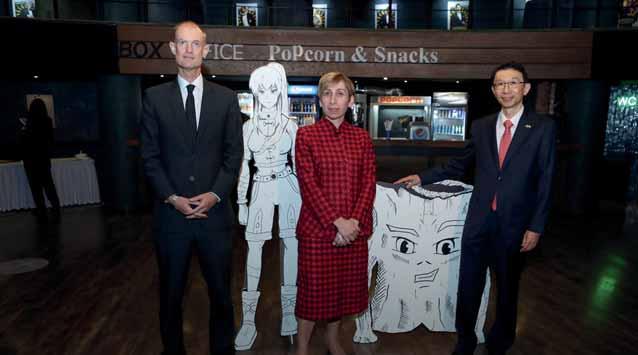
"It is lovely to see a message of peace and harmony expressed with such style.
Japan's essential support to forest protection here, in Georgia, is brought to a wide audience in this wonderful manga cartoon,” said Nick Beresford, UNDP
Resident Representative in Georgia.
“The Government of Georgia implements important reforms to promote sustainable forest management at the national and local levels. Environmental education is a critical part of this work. It helps people explore environmental issues, engage in problem-solving, and take action to improve the environment,” said Natia Iordanishvili, Deputy Chairperson of the National Forestry Agency.
The animation “Forest My Friend” was commissioned by UNDP and created by the Georgian organization “Democracy Lab” (DemLab) as part of a broader public campaign for sustainable forest management. Following the first show in Tbilisi, the animated manga will travel to the villages across Georgia where UNDP, Japan and NFA will organize film shows and discussions for schoolchildren and youth.
GEORGIA’S CLIMATE PROMISE
Georgia’s lush forests cover over 43% of the country’s territory and provide millions of people with a source of livelihood, clean water, fresh air and disaster protection. Forests capture greenhouse gas emissions and counter the harmful effects of climate change. Nevertheless, this priceless natural resource is threatened by excessive use, illegal logging
and wildfires. Almost three-quarters of Georgia’s population, especially people living in rural areas, still rely on firewood for heating and other needs. Unsustainable timber consumption reaches 2.4 million cubic meters a year, which costs Georgia around GEL 446 million annually. Wildfires destroy and damage thou-
sands of hectares of forest every year. The adoption of Georgia’s new Forestry Code in 2020 marked the launch of forestry reform aimed at promoting sustainable forest management and reducing the risk of illegal logging and wildfires.
In 2021, Georgia adopted the National Climate Change Strategy and updated
its Nationally Determined Contributions to the Paris Agreement. According to this ambitious climate pledge, by 2030, Georgia will unconditionally reduce greenhouse gas emissions to 35% below the 1990 baseline level and will increase forest carbon capture capacity by 10% from the 2015 levels.
The Welsh-Georgian Warm-up
BLOG BY NUGZAR B. RUHADZE
The time has arrived when it makes sense for us Georgians to follow in the footsteps of Welsh sporting journalism and unite in a kind of popular union, like, for instance, ‘Georgia’s Rugby Fans & Writers Club’. This might sound a little tongue-in-cheek, but we have a very attractive example before us to consider: The Welsh Rugby Writers’ Association already exists out there, vigorously and effectively functioning in the country, stationed in its capital city of Cardiff, and masterfully promoting rugby culture not only in Great Britain, but worldwide too. I am utterly convinced that we have to make the same practicable move, without any delay, in this country too. After all, we are the inheritors of the longstanding Georgian Lelo tradition, which indeed deserves much more public and governmental attention than it enjoys today.
Just two days prior to the memorable Saturday of November 19, 2022, the Rugby Writers Association, headed by its very likable chairman Alex Bywater, arranged a wonderful soirée for their Georgian friends and colleagues, who had arrived the same day in Cardiff to root for the Georgian Borjgalosani (a Borjgali is a seven-pointed symbol of the sun and eternity) rugby team in the game with the Welsh ‘Dragons’ that would see the host team losing the home game to the
Georgians 12 to 13.
Alex Bywater is a Cardiff-based rugby and football journalist, who intensively contributes to the whole national press.
This handsome and talented young writer and journalist did his utmost to make the Welsh-Georgian club-to-club interaction a real success. The evening turned out to be a genuine celebration of love and friendship between the Georgian and the Welsh peoples. Dur-

COMMERCIAL DEPARTMENT
Commercial Director: Iva Merabishvili Marketing Manager: Natalia Chikvaidze
EDITORIAL DEPARTMENT: Editor-In-Chief: Katie Ruth Davies
ing that warm and meaningful evening, the Rugby professionals as well as their fans exchanged experience and information, including the young and astute Borjgalosani coach Levan Maisashvili, who communicated with the audience in English, using a lot of zest and humor in his talk. The event was a marvelous warm-up for all present, and it worked as an excellent introduction to the hotly anticipated match. The author of this
Journalists: Ana Dumbadze, Vazha Tavberidze, Tony Hanmer, Emil Avdaliani, Nugzar B. Ruhadze, Michael Godwin, Ketevan Skhirtladze, Mariam Mtivlishvili, Erekle Poladishvili
Photographer: Aleksei Serov
piece has also been given a chance by Alex Bywater to present the future Lelo documentary being created by the Georgian cinematographers. A promise was made to show the film someday in Cardiff. The reaction of the attending audience was enthusiastic.
On the Georgian side, the role of the counterpart to Alex Bywater was played by Nikoloz Alavidze, the bona fide goand-get-it-done counselor to the Geor-
Website Manager/Editor: Katie Ruth Davies
Layout: Misha Mchedlishvili Webmaster: Sergey Gevenov
Circulation Managers: David Kerdikashvili, David Djandjgava
ADDRESS
1 Melikishvili Str. Tbilisi, 0179, Georgia
gian Rugby Union President. The two gentlemen worked so perfectly well in ensemble that all of us participants felt extremely happy and comfortable all the way through our get-together. Now, why do things like this matter? We are talking here not just about the present and the future of rugby in Georgia, but our national chance to turn Georgia into a factual distinguished international player with a prospect to move from a lower level of the world rugby community to the highest one, which definitely makes Georgia a talkedabout and reckoned-with country. Just one victory of that level, which we witnessed that delightful day in the recent Georgia-Welsh game, filled the British newspapers with the hot sporting news that there is a nation somewhere out there that is capable of overpowering one of the strongest teams in the world. This fact cannot be ignored or even taken easy. This is a life-size fact that deserves deep analysis and consideration for the future of Georgian sports. I am more than sure that the relevant thinking heads and decision-making figures in Georgia have already elevated their activity to the level of better plans and efforts, conducive to even bigger triumphs. The incentive is in place and the public support is more than enough. And international encounters like the ones described above happen to be not just a trivial drop in a bucket, but the crest of a wave that could carry the Borjgalosani bunch of Sakartvelo towards even stronger wins and daring dreams.
Tel.: +995 32 229 59 19
E: info@georgiatoday.ge
F: GeorgiaToday
ADVERTISING & SUBSCRIPTION
+995 555 00 14 46
E-mail: marketing@georgiatoday.ge
Reproducing material, photos and advertisements without prior editorial permission is strictly forbidden. The author is responsible for all material. Rights of authors are preserved. The newspaper is registered in Mtatsminda district court.
GEORGIA TODAY DECEMBER 2 - 8, 2022 11 SOCIETY GEORGIA TODAY
PUBLISHER & GM
George Sharashidze
Reg. # 06/4-309 SPORTS
A fantastic club event in Cardiff as the Welsh Rugby Writers' Association hosted the Georgians before Saturday’s Test.






 BY ANA DUMBADZE
BY ANA DUMBADZE
























